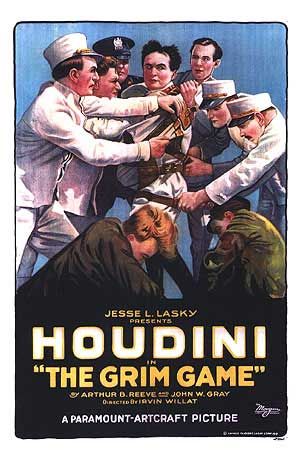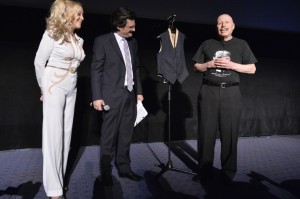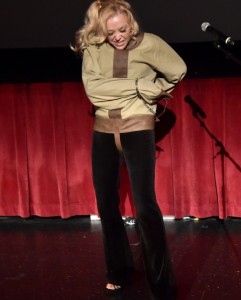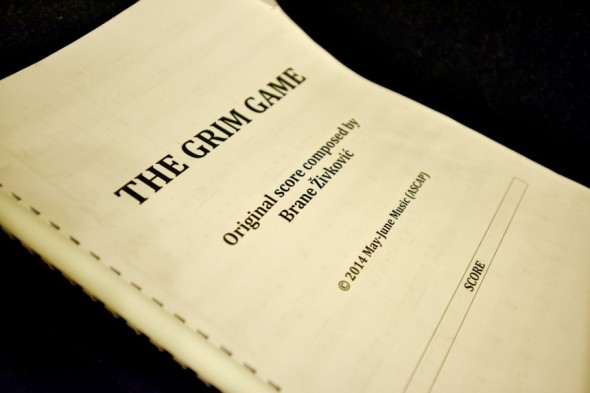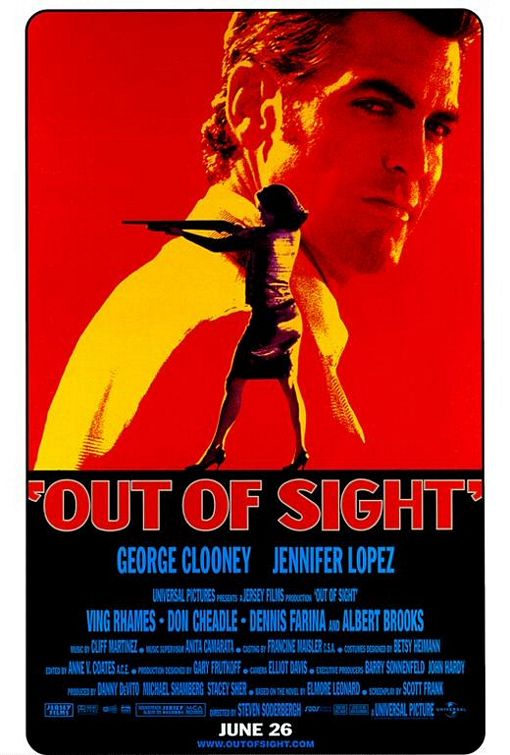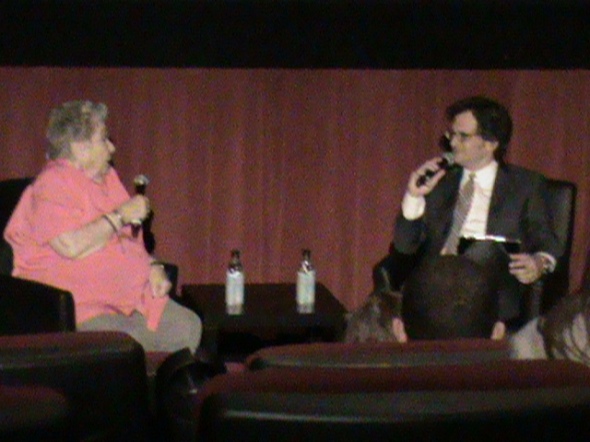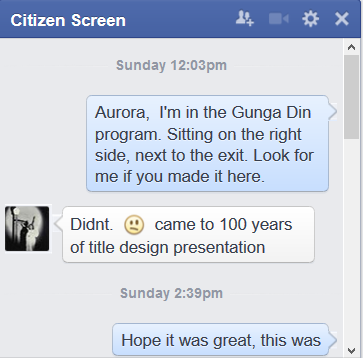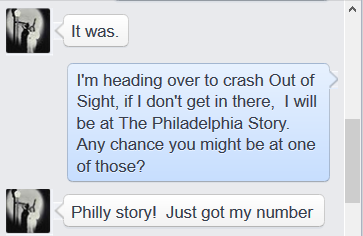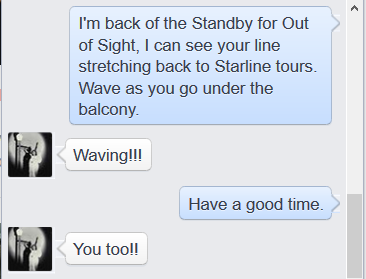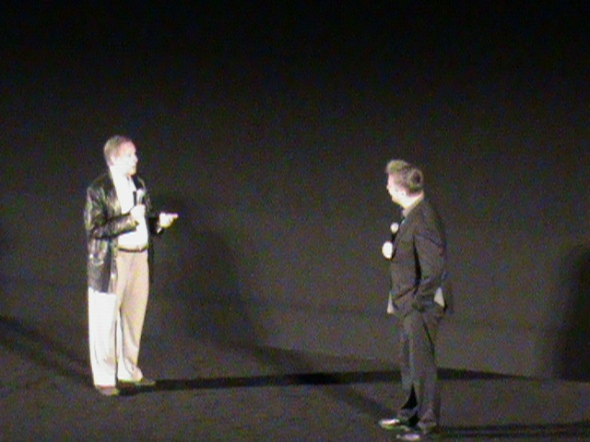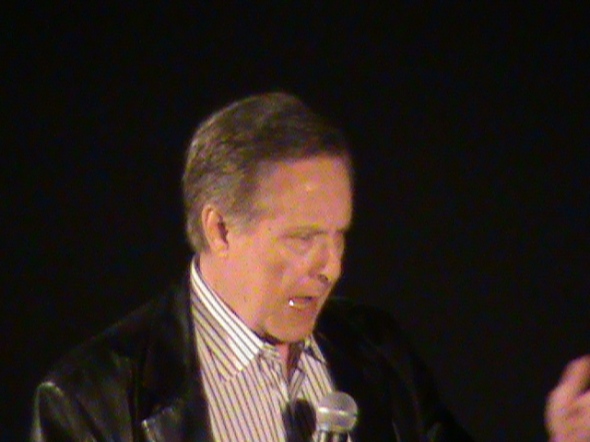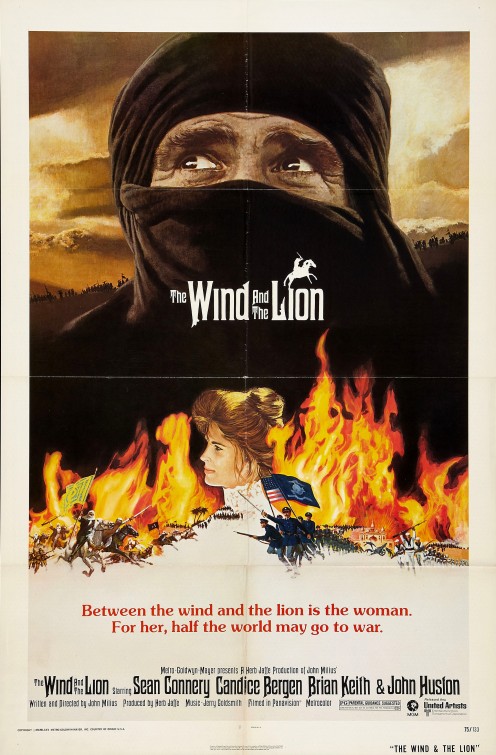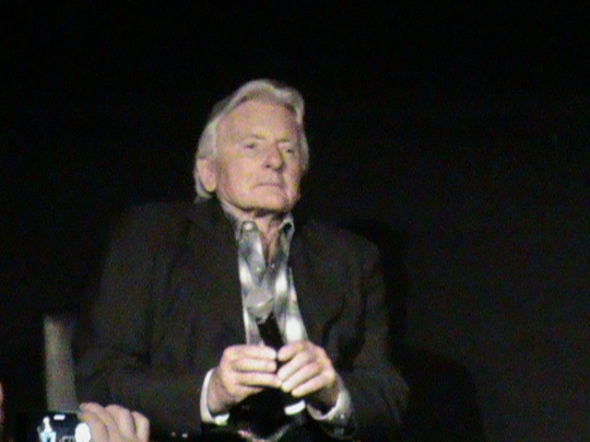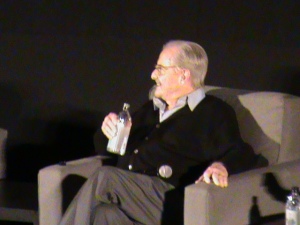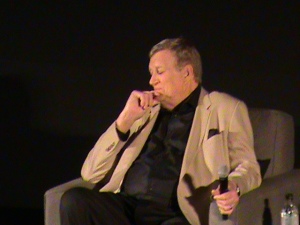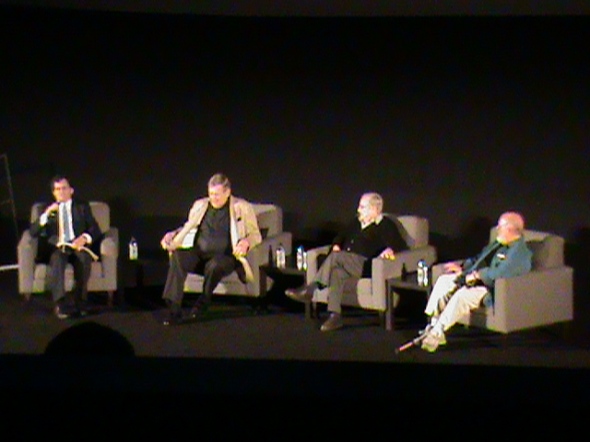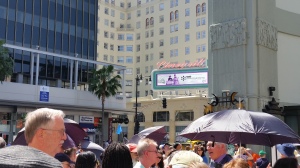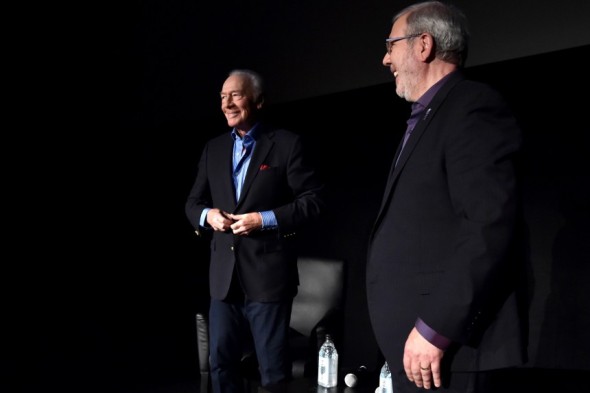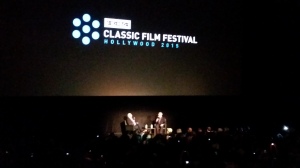 I have met my daughter after work for screenings in Hollywood, several times before. She works in Venice and we live in Glendora. Those of you not familiar with Southern California topography simply need to know these are opposite sides of L.A. County and Hollywood is somewhere in between. Usually, I drive down to the Egyptian Theater but since I was free in the afternoon yesterday, I availed myself of public transportation. I took the train to Union Station and then the subway to Hollywood and Highland, where I walked the two blocks to the theater. My phone rang as I entered the courtyard and it was Amanda, asking where I was. When I told her she asked if I was inside, because she did not see me, ...for the two extra seconds that it took me to come around the corner. We had managed to simultaneously reach the box office from opposite ends of the world. Timing is everything. It was then that we discovered the movie was sold out and we waited in the Stand-by line. There were about thirty of us and several people bought tickets from others who had extras. That is finally how we got in, and ended up a little closer than we might have chosen otherwise but still in seats that were very workable.
I have met my daughter after work for screenings in Hollywood, several times before. She works in Venice and we live in Glendora. Those of you not familiar with Southern California topography simply need to know these are opposite sides of L.A. County and Hollywood is somewhere in between. Usually, I drive down to the Egyptian Theater but since I was free in the afternoon yesterday, I availed myself of public transportation. I took the train to Union Station and then the subway to Hollywood and Highland, where I walked the two blocks to the theater. My phone rang as I entered the courtyard and it was Amanda, asking where I was. When I told her she asked if I was inside, because she did not see me, ...for the two extra seconds that it took me to come around the corner. We had managed to simultaneously reach the box office from opposite ends of the world. Timing is everything. It was then that we discovered the movie was sold out and we waited in the Stand-by line. There were about thirty of us and several people bought tickets from others who had extras. That is finally how we got in, and ended up a little closer than we might have chosen otherwise but still in seats that were very workable.The films were introduced by a guy from an effects based organization, I was negligent in getting his name or remembering the name of the group. Several seats were up front and it turns out that at the break we would be treated to a behind the scenes slide show of photos from the production of "Aliens" by some of the effects wizards behind the movie magic. So it was definitely something to look forward to. Our host asked the audience how many were seeing these films on the big screen for the first time, and I was surprised to see the hands of nearly two thirds of the audience go up. He shook his head and wondered out loud where all these people have been for the last thirty years. Anyway the films then began.
 It is a great experience to be able to contrast the styles and moods of the two films from a single screening. "Alien" is atmospheric and moody and builds a sense of tension slowly. It is a horror film, but one that is smart and creates suspense deliberately and with a dark style. This is the same theater where I first experienced the movie back in 1979 and it was fun to tease Amanda with that information, she gets tired of my nostalgic ramblings sometimes so it is a dad's privilege to annoy a child with useless personal trivia from time to time. If you click on the image of the poster, it will take you to the original post I did from the Movie A Day project back in 2010.
It is a great experience to be able to contrast the styles and moods of the two films from a single screening. "Alien" is atmospheric and moody and builds a sense of tension slowly. It is a horror film, but one that is smart and creates suspense deliberately and with a dark style. This is the same theater where I first experienced the movie back in 1979 and it was fun to tease Amanda with that information, she gets tired of my nostalgic ramblings sometimes so it is a dad's privilege to annoy a child with useless personal trivia from time to time. If you click on the image of the poster, it will take you to the original post I did from the Movie A Day project back in 2010.The guests presenting the slide show between the film were quickly introduced, and I got only two names for sure. They were the Academy Award winning brothers Robert and Dennis Skotak, and they shared several personal memories about the making of "Aliens". Digital computer work was mostly new when they made the film with James Cameron. They had honed their craft working on Roger Corman films like "Battle Beyond the Stars" and "Galaxy of Terror". Several of the pictures they shared showed them and young Mr. Cameron behind the scenes of those very modestly budgeted films. It was their experience on those pictures that allowed Cameron to make the film on the scale he envisioned for a budget almost half of what Fox thought it would need to be. In fact, that is why he got the job.
This shot taken from my seat shows how some of the props and sets were destroyed after the filming, because Pinewood Studios would charge a storage fee if they were left on the lot and sending them all back to Hollywood would have been too expensive. Film geeks everywhere will mourn the fact that the sleep pods from this film are not collectibles that they could buy on ebay and then put in their own bedrooms.
Like the special features programs on the home video versions of the films, last night's discussion was filled with little details about the techniques used and the problems solved during filming. The secrets I heard about the loader that Ripley uses to battle the alien Queen at the end of the movie were really cool. The fact that Cameron himself designed the Alien Queen because they could not afford to hire H.R. Giger to do the job was also interesting.
The presentation went on for a good thirty or forty minutes. There were some other tech guys peaking as well and I am so sorry that I was not taking notes and can't give them the credit they deserve for the work they did on the film and the kindness they showed for coming out lat night.
"Aliens" is a different creature than the first film. It has horror elements but it is basically an action film set on a different planet. The scenario and the look of the weapons are probably responsible for much of the design of modern video games like Halo. This is a shootum up in outer space. It does have a wonderful central spine concerning the relationship between Ripley and the young survivor Newt.
 The pacing and the music are two ways that the films are distinct. "Alien" unfolds slowly with a ethereal electronic score by my favorite film composer Jerry Goldsmith. James Horner's much more bellicose, Academy nominated score, is a perfect fit for the action beats of the film and the G.I. based plot. The humor in the film is often provided by the Marine mentality of the troops versus the corporate thinking of Paul Reiser's Burke. Bill Paxton provides fantastic comic relief and if you look at the mashup I included in my post on an "Aliens" screening from a couple of years ago, you will find it a great contrast to his character in "Edge of Tomorrow".Again, if you click on the poster to the left, it will take you to the Vlogpost that I did on this film, if you have twelve minutes , I think you will enjoy.
The pacing and the music are two ways that the films are distinct. "Alien" unfolds slowly with a ethereal electronic score by my favorite film composer Jerry Goldsmith. James Horner's much more bellicose, Academy nominated score, is a perfect fit for the action beats of the film and the G.I. based plot. The humor in the film is often provided by the Marine mentality of the troops versus the corporate thinking of Paul Reiser's Burke. Bill Paxton provides fantastic comic relief and if you look at the mashup I included in my post on an "Aliens" screening from a couple of years ago, you will find it a great contrast to his character in "Edge of Tomorrow".Again, if you click on the poster to the left, it will take you to the Vlogpost that I did on this film, if you have twelve minutes , I think you will enjoy. One final note, Sigourney Weaver became a star with her role as Ripley in these films. She is the strong foundation on which these stories are built. She deserves all the credit she can get for making these two films favorites of movie fans from around the world. Pretend the other films in this series don't exist and you will have a perfect pair of bookends with these two movies.





